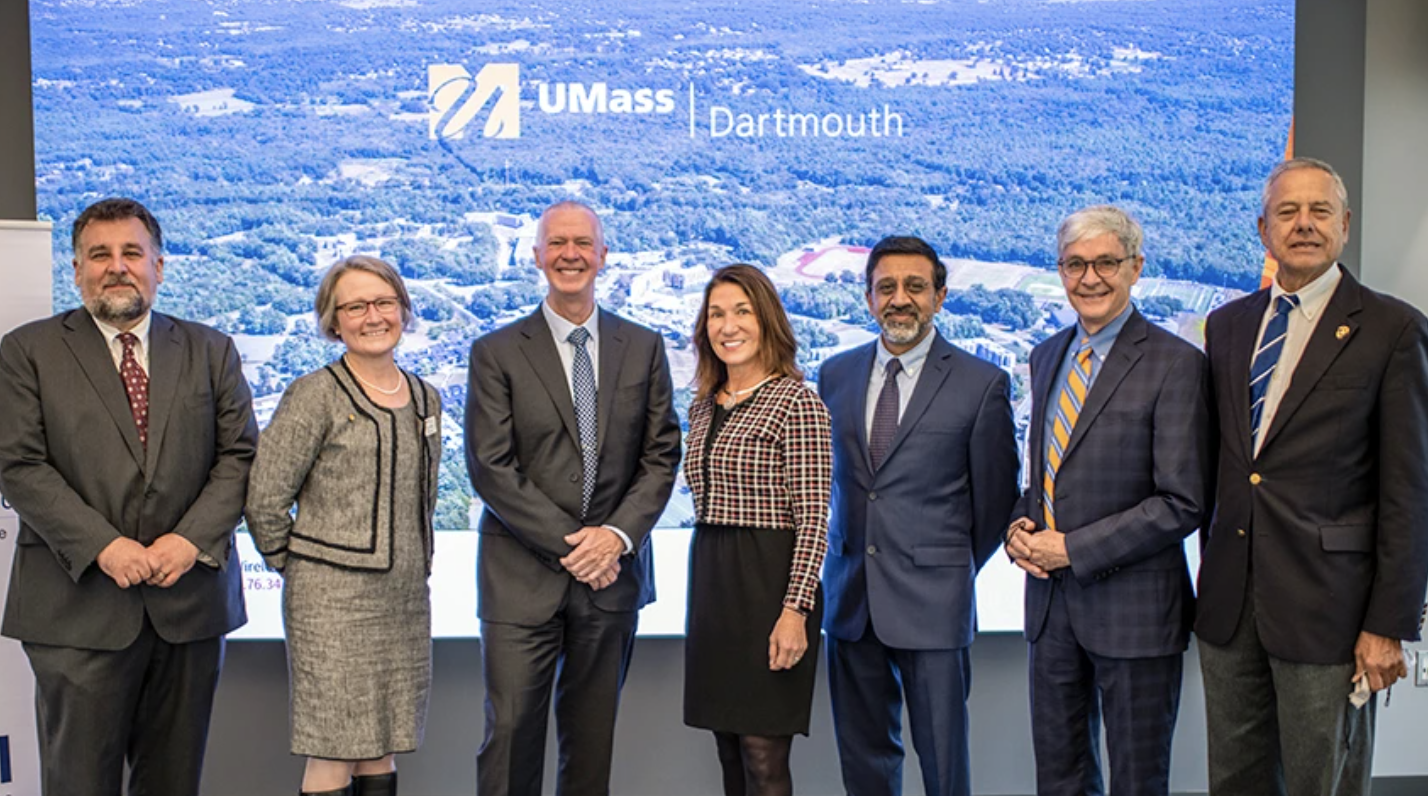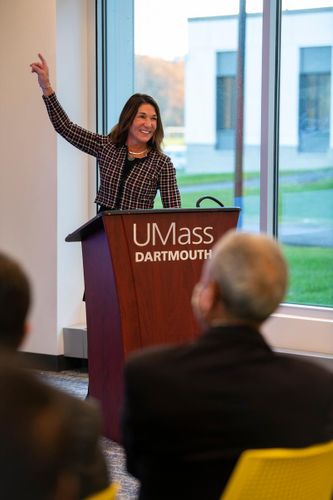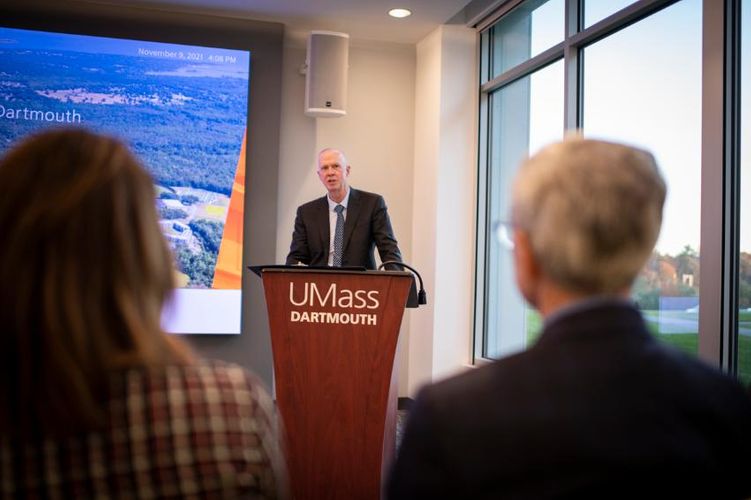UMass Dartmouth awarded nearly $1.2M for new Biodegradable Plastics Lab
Baker-Polito Administration awards $700k, PrimaLoft gives $450K in public-private investment to boost new marine tech research facility for the South Coast

DARTMOUTH, MASS. – Yesterday, Lt. Governor Karyn Polito and executives from UMass Dartmouth celebrated the announcement of a new $739,936 award from the Commonwealth of Massachusetts to support the development of a new research and development laboratory in New Bedford to study biodegradable and ocean-safe plastics. The new Plastics Biodegradation Laboratory at UMass Dartmouth will enable efficient testing of plastic biodegradation, helping address the significant waste caused by traditional plastics used in textiles, packaging, and other products that accumulate in the ocean and other water resources.
The state grant was awarded by the Collaborative Research and Development Matching Grant program, an effort managed by the Innovation Institute at the Massachusetts Technology Collaborative (MassTech), and will be paired with $1 million in match funding, more than $450,000 from private industry partners, including leading advanced materials companies such as PrimaLoft. The launch of the new lab will advance UMass Dartmouth’s research in advanced materials and the Blue Economy and make needed testing capabilities available for Industry.

“We are pleased to make investments across the state to support projects like this, which are addressing critical demands for new, innovative products,” said Governor Charlie Baker. “This investment in new research infrastructure at UMass Dartmouth will further strengthen Massachusetts’ Blue Tech sector, working collaboratively with the private sector to create innovative products and grow jobs here in the Commonwealth.”
“Institutions like UMass Dartmouth play a critical role in preparing Massachusetts’ students for their future careers, teaching them how to tackle major global challenges such as plastic waste,” said Lt. Governor Karyn Polito, who chairs the Commonwealth’s Seaport Economic Council. “This new lab, and the partnerships with leading organizations in manufacturing and research, will solidify the Commonwealth’s role as a global leader when it comes to R&D in the Blue Tech sector.”
The main biodegradability lab will be housed at UMass Dartmouth’s School for Marine Science & Technology (SMAST) campus in New Bedford, a newly expanded state-of-the-art facility with classrooms, labs, and offices for faculty, staff, and students. The Commonwealth’s capital investment will fund new lab equipment which will address material biodegradability and its environmental impact, specializing in the ocean impacts, and advancing the development of new, environmentally-sensitive products. In addition, investments on the main campus include auxiliary services in toxicology testing and microplastics assays. The lab will fill an important niche for businesses interested in the field, providing additional research capacity for the evaluation of plastic biodegradability.
In addition to PrimaLoft, partners on the project include Radical Plastics of Beverly, Paramount Planet Product, UMass Boston, UMass Lowell, the Marine Biological Laboratory in Woods Hole, Boston-based SeaAhead, and the U.S. Army Soldier Combat Capabilities Development Command Soldier Center.
Project estimates call for positive economic impacts within two years of launch, noting the large potential market for biodegradable products being driven by consumer demand and new legislation aimed at limiting plastic pollution. Through the collaborations with Radical Plastics and Paramount Planet Product, the project expects to support the creation of approximately 75 direct jobs starting in 2023 and estimates an additional 232 jobs supported by supply chain and spending effects.
“I want to thank our partners at the Mass Tech Collaborative and PrimaLoft who have helped UMass Dartmouth continue our research focus in the key areas of sustainability and the Blue Economy,” said UMass Dartmouth Chancellor Mark A. Fuller. “With this new biodegradability lab, our university will be able to create research opportunities for students and faculty while providing impactful results and economic benefits to government and industry.”
“With sustainability at the forefront and new biodegradable materials and technologies emerging, the need for testing and validation is paramount,” said Mike Joyce, PrimaLoft president and CEO. “Textile materials often wind up in landfills, marine environments and wastewater systems, and we’ve developed biodegradable technologies that combat this issue at the fiber level. The expertise provided by the University of Massachusetts Dartmouth, and in particular the School for Marine Science & Technology, is a perfect fit for validation of these technologies. The UMass Dartmouth legacy in the textile sciences, as well as its leadership position in marine sciences and sustainability, makes it a logical location for this new laboratory.”
According to the U.S. Census Bureau, the Plastic Product Manufacturing Industry in the United States produced $201.1 billion worth of plastics in 2019, with $3.9 billion from products in Massachusetts. However, biodegradable alternatives make up a fraction of that overall market, highlighting the strong growth opportunity for Massachusetts firms to deliver biodegradable products and address future demand.

“The Commonwealth’s tech and innovation sector is well known for tackling major challenges and by partnering with UMass Dartmouth and MassTech, this grant will help this sector address a major market opportunity that will have positive impacts on our environment,” said Housing and Economic Development Secretary Mike Kennealy. “The Baker-Polito Administration has made investments in research and development a critical building block of our economic development plans and this grant will further the momentum we’ve generated while also capitalizing on the South Coast’s centuries-long history in manufacturing.”
“The Collaborative R&D Fund was created to fund exciting partnerships like this, projects that bring together partners from academia, industry, and government to address major business opportunities,” said Pat Larkin, Director of the Innovation Institute at MassTech. “This fund has made key investments in critical industries for Massachusetts, but this is the first that has tackled a challenge like this, with a direct tie to disposable consumer goods and the companies solving the problem. It’s an exciting opportunity for the South Coast and Massachusetts overall.”
To date, the Collaborative R&D Matching Grant program has awarded more than $28 million, leveraging more than $50 million in matching contributions from outside partners. This includes 10 projects that have supported innovative industry/academic collaborations and investment in novel R&D infrastructure to bolster the Massachusetts tech and innovation economy statewide. Emerging industries supported include cloud computing, marine robotics, printed electronics, cybersecurity/data science, and nanomaterials/smart sensors. These investments have led to the formation of 79 new industry partnerships and 54 intellectual property and licensing agreements in the past two years.
“The development of the Blue Economy is integral to the South Coast’s economic future. I am thrilled that UMass Dartmouth is receiving this award that will allow it to continue to be a leader in the field,” said Senator Michael J. Rodrigues, Chair of the Senate Committee on Ways and Means. “Thank you to the Baker-Polito Administration and the Massachusetts Technology Collaborative for their support of this industry and thank you to Chancellor Fuller for his stalwart leadership in keeping UMass Dartmouth and the South Coast at the cutting edge of the Blue Economy.”
“UMass Dartmouth continues to be a leader in developing the Blue Economy and solutions to climate challenges in the Commonwealth and beyond,” said Senator Mark Montigny. “I am pleased that this capital grant, supported by the Legislature, from the Massachusetts Technology Collaborative is being awarded to UMass Dartmouth. It will bolster the campus’ efforts to create critical technology to stop ecological disaster from polluting materials in our ecosystem.”
“Floating plastic has done immeasurable damage to our oceans and waterways,” said Representative Paul A. Schmid III. “This research has the potential to reduce significant harm to our planet. I am thrilled UMass Dartmouth is taking an active role in such important work.”